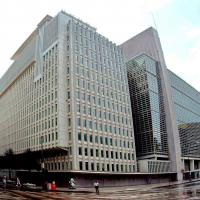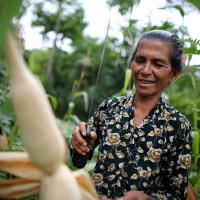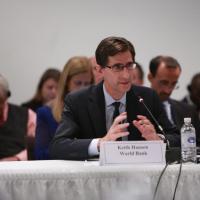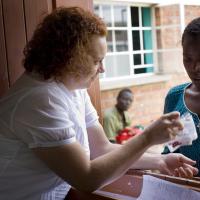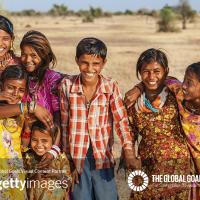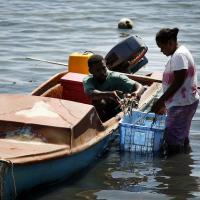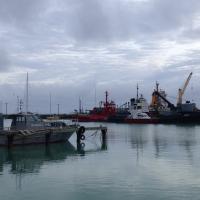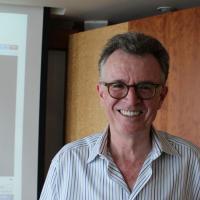- Home
- About
- People
- Publications
- Podcasts
- Asia & the Pacific Policy Studies
- Events
- Annual Australasian AID Conference
- The Mitchell Orations
- PNG Update
- Pacific Update
- Australian aid
- PNG Project
- Pacific Research Program
- Pacific migration
- PNG and Pacific scholars
- Global development policy
- Support us
- Contact us
- Drupal
Past events
Australian aid evaluations: development partnerships
9.15am–12.30pm 9 December 2015
Dereck Rooken-Smith, DFAT’s Office of Development Effectiveness; Jim Adams, DFAT’s Independent Evaluation Committee; plus many more.
On Wednesday 9 December, the Development Policy Centre hosted a forum to discuss and debate two recent aid evaluations by DFAT’s Office of Development Effectiveness (ODE).
The event addressed the issue of development partnerships with a focus on two recent ODE evaluations of the Australian NGO Cooperation Program (ANCP) and Australia’s non-core funding to the Asian Development Bank and the World Bank.
The multilateral banks and NGOs represent two of the Australian aid program’s more important delivery partners, and the evaluations contain a number of important findings and recommendations.
Speakers included staff from DFAT, the Australian Council for International Development (ACFID) and the Development Policy Centre. We also heard from Dereck Rooken-Smith - head of ODE - and Jim Adams, Chair of the DFAT’s Independent Evaluation Committee.
This forum is the latest in a regular series built around ODE evaluations. It was presented by the Development Policy Centre at Crawford School of Public Policy, The Australian National University.
» view program
» view presentations
» Listen to podcast - part 1 - non-core funding to the ADB and the World Bank
» Listen to podcast - part 2 - Australian NGO Cooperation Program
Standing with communities: results of Australian community-based climate change action grants in the Pacific and Southeast Asia
12.30–2pm 17 November 2015
Maria Cadahia-Perez, CARE International in PNG; Kate Duggan, Griffin Natural Resource Management; Cornelio Ase, Program and Humanitarian Manager, Oxfam Australia; Pia Treichel, Plan International Australia
Countries in the Pacific and Southeast Asia are amongst the most vulnerable to disasters and the impacts of climate change. Since 2010, the Australian Government has invested $34 million in the Community-Based Climate Change Action Grants (CBCCAG) program, in which ten Australian and International Non-Government Organisations (NGOs) have worked with local partners in the Pacific and Southeast Asia to build resilience to climate change and address development issues at local level.
At the end of this period, these projects have been evaluated and have shown real results in increasing the resilience of communities to the impacts of climate change, whilst achieving broader development outcomes. The panel discussion shared the results and lessons from CBCCAG program.
This public seminar was presented by the Development Policy Centre at Crawford School of Public Policy, The Australian National University in partnership with CBCCAG implementing agencies CARE, Live & Learn, Oxfam and Plan.
» read more
Global health and the World Bank: recent events and developments
5.30–6.30pm 11 November 2015
Mr Keith Hansen, Vice President, Human Development, World Bank Group.
Recent health events have highlighted the interconnected nature of the world and the disparities that exist in access to health services across the globe. The World Bank, and many other organisations around the world are trying to help bring about convergence in health access, treatments and outcomes. They do this in various ways - by strengthening national health systems in countries, ensuring that national resources are prioritised to support improvements in health outcomes, supporting global initiatives to tackle issues that extend beyond national borders such as pandemics, anti-microbial resistance, etc. Mr Keith Hansen presented recent events and developments in global health and discussed the Bank’s role in supporting global health initiatives.
Mr Keith Hansen is the Vice President for Human Development at the World Bank Group, overseeing the Global Practices for education; health, nutrition, and population; and social protection and labour. Mr Hansen was also recently one of the co-vice presidents for all of the Global Practices responsible for the Bank Group’s new operating model, which brings together the best expertise to help tackle countries’ most complex development challenges.
Mr Hansen has also served as the World Bank Human Development Director for Latin America and the Caribbean. Previously, in his role as head of the AIDS Campaign Team for Africa, Mr Hansen spearheaded the Bank’s renewed approach to the epidemic.
This public lecture was presented by the Development Policy Centre at Crawford School of Public Policy, The Australian National University.
» read more
What do student exam results tell us about free education policy in PNG?
12.30–1.30pm 9 November 2015
Dr Anthony Swan, Research Fellow, Development Policy Centre, Crawford School, ANU.
The centrepiece of government policy in Papua New Guinea over recent years has arguably been the Tuition Fee Free (TFF) policy implemented in 2012. The TFF effectively eliminated school fees for elementary, primary and secondary students and provided schools with direct funding at a level which on average over-compensated for their loss of school fees. While the TFF has improved access to education and school resources, little is known about its effect on education outcomes as measured by exam results, particularly across gender, location and student age dimensions.
In this public seminar, Dr Anthony Swan – Research Fellow at the Development Policy Centre – presented findings based on multilevel modelling of grade eight student level exam results across PNG. The presentation highlighted positive impacts but also the unintentional and negative consequences of the TFF on student learning outcomes.
This public seminar was presented by the Development Policy Centre at Crawford School of Public Policy, The Australian National University.
» read more
Papua New Guinea: pathways from a potential crisis
12.30–1.30pm 26 October 2015
Mr Paul Flanagan, Visiting Fellow, Development Policy Centre, Crawford School, ANU.
Papua New Guinea will need to make some substantial adjustments in its budget and exchange rate settings to avoid the twin risks of an economic crisis similar to the ones it faced in the 1990s and a further growth slowdown. Investment ratings agencies Moodys as well as Standard and Poors have moved PNG’s outlook to negative; the PNG Treasury mid-year budget document showed 20 per cent of planned revenue was no longer likely; large expenditure cuts have been foreshadowed by the government; economic activity is slowing; and businesses are finding it hard to get foreign exchange.
In this public seminar, Mr Paul Flanagan – a visiting fellow at the Development Policy Centre, a former senior executive at the Australian Treasury, and former senior advisor to the PNG Treasury – presented the challenges facing PNG in a historic and international context, and outline the options. In particular, revenue, expenditure and financing options.
This public seminar was presented by the Development Policy Centre at Crawford School of Public Policy, The Australian National University.
» read more
Careers in Development
5–6pm 20 October 2015
Ms Kath Taplin, Senior Development Manager, Femili PNG; Mr Nat Burke, Policy Adviser, Advocacy & Justice for Children, World Vision International and Mr Peter Russell, Project Manager, International Development Assistance, GHD; Ms Alison Chartres, Assistant Secretary, Development Policy and Education Branch, Development Policy Division, DFAT
Many young people are interested in a career working on some of the toughest challenges facing our world. Thousands volunteer in development organisations across the country, and development studies and international relations are among the most popular undergraduate university courses in Australia. Working in a field that aims to make a difference is no doubt appealing, but it can be tough for students to know where to start.
This public seminar, hosted by the Development Policy Centre and the ANU Aid and Development Learning Community, gave students the opportunity to hear from those working in the development sector and to ask questions. Panelists have had diverse careers in government, NGOs, the private sector, and as volunteers.
Speakers included:
• Ms Kath Taplin Senior Development Manager, Femili PNG
• Mr Nat Burke Policy Adviser, Advocacy & Justice for Children, World Vision International
• Mr Peter Russell Project Manager, International Development Assistance, GHD
• Ms Alison Chartres Assistant Secretary, Development Policy and Education Branch, Development Policy Division, Department of Foreign Affairs and Trade
This public seminar was presented by the Development Policy Centre at Crawford School of Public Policy and the Aid & Development Learning Community, the Australian National University.
PNG: pathways to gender parity
12–1.30pm 13 October 2015
Various speakers.
This panel discussion showcased high-profile speakers from Papua New Guinea and Australia. It explored current gender parity issues in Papua New Guinea, how business can work to adopt a diverse work force and how to expand the opportunities available to both men and women within the changing commercial and social environment of Papua New Guinea.
Speakers:
- Ms Avia Koisen Principal, Koisen Lawyers
- Dr Eric Kwa Secretary/CEO, PNG Constitutional Law Reform Commission
- The Honourable Malakai Tabar MP Minister for Higher Education, Research, Science and Technology in PNG
- Magistrate John Kaumi Mendi District Court Senior Provincial Magistrate
- Dr Linda Van Leeuwen Capacity Building Specialist and Manager, Anitua
- Professor Stephen Howes Director of the Development Policy Centre (Chair)
This panel discussion was part of the ANZ | PNG Gender Parity Symposium, held from 13- 15 October in Canberra, Brisbane and Sydney. For more information, go to: http://www.asiapacificprofessionals.org/png-gender-parity-symposium-2015/
» read more
Higher education issues and reform in Papua New Guinea
12.30–1.30pm 12 October 2015
The Hon Malakai Tabar MP, Minister for Higher Education, Research, Science and Technology, Papua New Guinea.
The Honourable Malakai Tabar MP discussed the issues and challenges that Papua New Guinea is currently facing in the higher education sector, and the reforms underway.
In 2007, The Hon Malakai Tabar MP was elected Member of Parliament representing the Gazelle Open Electorate. During his first term in parliament he was in Opposition, and was appointed Shadow Minister for Agriculture and Livestock. In 2012, he joined the Goverment through the National Alliance Party and in 2014 he was appointed Minister for the Department of Higher Education, Research, Science and Technology (DHERST).
Mr Tabar visited Australia to participate in the ANZ | PNG Gender Parity Symposium, held from 13- 15 October in Canberra, Brisbane and Sydney. For more information, go to: http://www.asiapacificprofessionals.org/png-gender-parity-symposium-2015/
» read more
Can the SDGs be achieved by 2030?
12.30–1.30pm 1 October 2015
Mr Chris Hoy, Overseas Development Institute (ODI); Ms Joy Kyriacou, Oxfam Australia; Ms Natasha Smith, Department of Foreign Affairs and Trade; Professor Stephen Howes, Development Policy Centre.
The Sustainable Development Goals (SDGs) provide an ambitious new agenda to guide global development efforts to 2030. Many have applauded the SDGs for their aspirational qualities – but others have reservations about the likelihood that countries will be able to achieve the agenda’s 17 goals and 169 targets, given the rates of success on the Millennium Development Goals.
A new flagship report from the Overseas Development Institute (ODI) outlines a set of projections for each of the SDGs – providing the best available snapshot of the progress we can expect to achieve over the next 15 years, assuming that current trends continue, and the areas that will require greater global effort. At the Australian launch of the report, speakers from academia, NGOs, and government examined where we are now, where we can expect to be by 2030, and what the development community needs to do to accelerate progress in the meantime.
Speakers included:
Mr Chris Hoy, Research Officer, Overseas Development Institute (ODI)
Ms Joy Kyriacou, Natural Resources and Finance for Development Advocacy Manager, Oxfam Australia
Ms Natasha Smith, First Assistant Secretary, Multilateral Development & Partnerships Division, DFAT
Prof Stephen Howes, Director, Development Policy Centre
This public lecture was presented by the Development Policy Centre at Crawford School of Public Policy, The Australian National University.
» read more
Do microcredit and family planning programs have their intended impact on poor households?
12.30–1.30pm 23 September 2015
Dr Jaikishan Desai, Senior Lecturer and Director of International Students, School of Government, Victoria University of Wellington.
In this public lecture, Dr Jaikishan Desai summarised the results of a cluster randomised control trial which sought to measure the impact of exposure to family planning and credit programs in two regions of Ethiopia over a three-year period.
Results show that family planning programs had no effect on contraceptive use, fertility and desired family size. The microcredit programs were successful in increasing engagement in the credit market (increased borrowing) but had no measurable impact on a range of outcomes related to income generation and economic well-being.
Dr Desai is a Senior Lecturer and Director of International Students in the School of Government at Victoria University of Wellington, New Zealand. He has graduate degrees in economics (PhD) and biostatistics (MSc) and teaches undergraduate and post-graduate courses in development policy and policy research methods. His research interests include issues in development, health, and behavioral economics in India, Vietnam, Myanmar, Ethiopia, and New Zealand. Prior to joining Victoria University he worked in international development in more than a dozen countries in Africa, Asia, and the Caribbean and for a variety of organizations including the Government of Mozambique and the World Bank.
This public lecture was presented by the Development Policy Centre at Crawford School of Public Policy, The Australian National University.
» read more
Out of the rubble: recovering from the Nepalese earthquake
12.30–1.30pm 27 August 2015
Ms Liz Satow, National Director, World Vision International Nepal.
World Vision Nepal’s National Director Liz Satow shared her experience of the 2015 earthquakes and how World Vision has been working with communities, the Government, and other NGOs to restore services. She also talked about the challenge of quickly switching the focus from long-term development activities into short-term relief operations and then planning for the transition back to development activities again.
Liz Satow has held positions as Relief Coordinator and Security Officer for World Vision Jerusalem/West Bank/Gaza and Consultant for the World Vision Pacific Development Group. In 2006, Liz joined World Vision’s Global Rapid Response Team (GRRT), where she responded to major disasters for over six years. Following the GRRT, Liz took on the role of the Humanitarian Design, Monitoring and Evaluation Advisor for the Asia Pacific Region in World Vision. She has held her current position as World Vision Country Director for Nepal since July 2014.
This public lecture was presented by the Development Policy Centre at Crawford School of Public Policy, The Australian National University.
» view presentation
» listen to podcast
The evolving role of multilateralism in ending hunger and malnutrition
12.30–1.30pm 12 August 2015
Ms Gerda Verburg, Chair of the UN Committee on World Food Security (CFS) and of the World Economic Forum (WEF) Council on Food Security and Nutrition.
Although enough food is being produced to feed everyone on the planet, more than 795 million people remain undernourished. Even as global food production is stepped up to feed an anticipated global population of more than 9 million people by 2050, one third of all currently produced food is lost or wasted. Farmers struggle to maintain a profitable livehood, and are confronted with increasing environmental constraints in the face of climate change and depleted natural resources. In developing countries agriculture employs as much as 60 per cent of the labour force but fewer and fewer see agriculture as a viable career. The problems are well-known. But how can multilateralism help? The year 2015 marks the end of the monitoring period for the Millennium Development Goal (MDG) targets. As the world prepares to adopt the post 2015 Sustainable Development Goals, it is high time to reflect on the necessarily evolving role of multilateralism in ending hunger and malnutrition globally.
In this public lecture, Ms Gerda Verburg - Chair of the UN Committee on World Food Security (CFS) and of the World Economic Forum (WEF) Council on Food Security and Nutrition - talked about the interconnected challenges faced today by the immense variety of actors, and the role global policy convergence can play to positively transform agriculture and food systems and eradicate hunger and malnutrition globally.
This public lecture was presented by The Crawford Fund and the Development Policy Centre at Crawford School of Public Policy, The Australian National University.
» read more
The fish is the friend of matriliny: reef density and matrilineal inheritance in Melanesia
12.30–1.30pm 31 July 2015
Mr Joseph Vecci, PhD scholar, Department of Economics, Monash University
In this public lecture, Joseph Vecci from Monash University explained the results of a recent co-authored paper on reef density and matrilineal inheritance in fishing communities in the Solomon Islands. He discussed how reef density is associated with the prevalence of matriliny, offering evidence from a sample of 186 societies across the world as well as a sample of 59 small-scale horticultural fishing communities in the Solomon Islands. In addition to this, he provided an explanation of why this relationship is thought to exist - an explanation based around the sexual division of labour and on inclusive fitness. The presentation also documented some of the demographic consequences of matrilineal inheritance, including smaller household and village population size.
Joseph Vecci is a PhD student in the Department of Economics, Monash University. His research interests include development and experimental economics. Specifically, he is conducting experiments to understand the effects of social norms on gender inequality in developed and developing countries. Joe has also worked as a consultant for the World Bank examining the impact of its rural development program in Solomon Islands.
This public lecture was presented by the Development Policy Centre at Crawford School of Public Policy, The Australian National University.
» view presentation
» listen to podcast
Leveraging the benefits of Asia’s integration and growth for Pacific economies
2–3pm 21 July 2015
Dr Christopher Edmonds, Senior Economist, Pacific Department, Asian Development Bank; Dr Matthias Helble, Research Fellow, Asian Development Bank Institute.
How can Pacific island economies, including those of Papua New Guinea and Timor-Leste, tap into projected growth in Asia? How can economic and financial integration between Asia and the Pacific be expanded to benefit both regions?
This seminar featured two authors of a recent Asian Development Bank (ADB) book, Leveraging the Benefits of Asia’s Integration and Growth for Pacific Economies, who explored these issues, identified critical constraints to integration and suggested relevant policy reforms.
Dr Christopher Edmonds is the Senior Economist in the Pacific Department at ADB, where he manages much of the Department’s economics research, including acting as Editor-in-Chief for the Department’s flagship publication, the Pacific Economic Monitor. He is also responsible for managing ADB’s work on a number of technical assistance projects in the Pacific Region—including acting as chair of ADB’s Impact Evaluation Committee — and joins project teams preparing ADB loan and grant projects.
Dr Matthias Helble joined the Asian Development Bank Institute (ADBI) as a Research Fellow in August 2013. His research interests include international trade, health, environment, and urban economics. His work has been published in flagship reports of international organisations such as the World Trade Organization’s World Trade Report, as well as in numerous books and scientific journals, including the Review of World Economics, Kyklos, Journal of World Trade, World Economy, Health & Place, and the Bulletin of the World Health Organization.
This public seminar was presented by the Development Policy Centre at Crawford School of Public Policy, The Australian National University.
» view presentations
» listen to podcast
Malaria R&D in a time of global partnerships
5.30–6.30pm 29 June 2015
Dr David Reddy, CEO, Medicines for Malaria Venture.
Medicines for Malaria Venture (MMV) is a global public-private and civil society collaboration that mobilises and shares knowledge and expertise, technology and financial resources to address the global health challenge posed by malaria.
MMV’s partners - including 28 pharmaceutical companies, 13 biotechs, 56 universities, 38 research institutes, 72 clinical sites and 50 government agencies - have developed the largest ever global pipeline of new antimalarial medicines. MMV and partners are now working on the development of an effective single dose cure that will tackle drug resistance and facilitate malaria eradication and elimination.
In this public lecture, Medicines for Malaria Venture CEO David Reddy discussed the impact, progress and opportunities that are driving global best practice for malaria drug development, and explained how product development partnerships are tackling global health challenges like malaria.
Dr David Reddy has been CEO of Medicines for Malaria Venture since January 2011. Under his leadership, this not-for-profit research foundation has brought forward five new antimalarial drugs, broadened its malaria-drug pipeline to include nine novel drugs in clinical development.
Prior to joining MMV, David was a Vice President in the Global Product Strategy Unit at F. Hoffman-La Roche Ltd in Basel, Switzerland, where he served as Pandemic Taskforce Leader. Prior to that he was the Global Franchise Leader for HIV/AIDS at Roche, where he oversaw the successful development and introduction of enfuvirtide, the first HIV fusion inhibitor.
This public lecture was presented by the Development Policy Centre at Crawford School of Public Policy, The Australian National University.
» view presentation
» listen to podcast
Global inequality: are the world’s poorest being left behind?
5.30–6.30pm 9 June 2015
Dr Martin Ravallion, Edmond D Villani Chair of Economics, Georgetown University.
Traditional assessments of progress against poverty and inequality put no explicit weight on increasing the standard of living of the poorest— raising the consumption floor. This public lecture showed that there has been remarkably little progress in raising the world’s consumption floor over the last 30 years. Neither economic growth nor greater coverage of social safety nets in the developing world has helped much in raising the floor. The poorest have seen very little progress. There has, however, been much progress in reducing the number of people living near the floor, and in reducing the numbers below international poverty lines. The presentation argued that the sharply rising gap between the top one per cent and the poorest is just one (albeit extreme) aspect of rising absolute inequality in the world. Modern economic growth has come with a rising absolute gap between the rich and the poor.
Dr Martin Ravallion holds the Edmond D Villani Chair of Economics at Georgetown University. Prior to joining Georgetown in December 2012 he was Director of the World Bank’s research department, the Development Research Group. He joined the Bank in 1988 and worked in almost all sectors and all regions over the following 24 years. Prior to joining the Bank, Martin was on the faculty of The Australian National University. He holds a PhD in economics from the London School of Economics (LSE) , and has taught economics at LSE, Oxford University, The Australian National University and Princeton University.
This public lecture was presented by the Development Policy Centre at Crawford School of Public Policy, The Australian National University.
» view presentation
» listen to podcast
Creating a national, sustainable microfinance institution: lessons from SANASA, Sri Lanka
12.30–1.30pm 14 May 2015
Dr PA Kiriwandeniya, Founder and Chairman, SANASA Federation.
Throughout Asia, the cooperative movement offered great potential as a vehicle for rural development but was long ago hijacked by local elites. In Sri Lanka, however, there is a flourishing and sophisticated micro finance and cooperative sector that serves as a development hub for many rural communities in the country
That transformation has been the life’s work of Dr PA Kiriwandeniya (Kiri). Beginning in the early 1970s as a village school teacher, Kiri experimented with ways of strengthening his own village society then progressively developed a strategy for forming district level societies using the same model. In 1978 SANASA was finally formed as a national movement of thrift and credit societies with Kiri as Chairman. Today SANASA provides small farmers througout Sri Lanka (including Tamil areas) with a full range of banking services including insurance, income generation and marketing support. Kiri’s current efforts are focused on the creation of a rural university.
Dr PA Kiriwandeniya has been Chairman of the SANASA Federation since 1978. He has been a member and director of a wide range of government advisory boards including the Poverty Alleviation Board and has served as Presidential Advisor on Rural Development. From 1994 to 1996 he was Chairman of the Peoples Bank. Dr Kiriwandeniya was granted an honorary doctorate by the University of Ruhuna in 2001 and is currently a council member of two national universities.
This public lecture was presented by the Development Policy Centre at Crawford School of Public Policy, The Australian National University.
» read more
2015 aid budget breakfast
9–10.30am 13 May 2015
Professor Stephen Howes, Director, Development Policy Centre, Crawford School, ANU; Dr Anthony Swan, Research Fellow, Development Policy Centre, Crawford School, ANU; Dr Julia Newton-Howes AM, CEO, Care Australia; and Ms Jacqui de Lacy, General Manager for Global Strategy, Abt JTA.
Last December, the Coalition announced the largest cuts to the aid budget in the history of the Australian aid program: $1 billion or 20 per cent in a single year. How and where will these savings be made? To what extent will key bilateral partners, such as PNG and Indonesia, be protected – and which countries and regions will experience the brunt of the cuts? Will multilateral and NGO allocations be protected, or savaged? Which sectors will be cut? Will humanitarian aid again be compressed?
On Wednesday 13 May, experts delivered detailed analysis and commentary during the third Development Policy Centre 2015 Aid Budget Breakfast. If you missed it, you can watch it on demand.
Speakers included:
- Prof Stephen Howes Director of the Development Policy Centre, and colleagues, who discussed aid volumes, allocations and policies.
- Dr Anthony Swan Research Fellow at the Development Policy Centre, who analysed the macro and fiscal context of the budget.
- Dr Julia Newton-Howes AM CEO of CARE Australia, and Ms Jacqui de Lacy, General Manager for Global Strategy at Abt JTA, who provided commentary on what the budget may mean for NGOs and other members of the Australian development community.
» view video
» view presentations
» listen to podcast
Make sure you also read our in-depth analysis on the blog and media mentions in the the lead-up to, and post-budget here.
This forum was presented by the Development Policy Centre at Crawford School of Public Policy, The Australian National University.
Has the Sector Wide Approach delivered improvements in population health?
12.30–1.30pm 30 April 2015
Mr Rohan Sweeney, Research Fellow at the Centre for Health Economics, Monash University.
Sector Wide Approaches (SWAps) for health emerged in the 1990s as a mechanism to improve efficiency of aid delivery and effectiveness of aid. Health SWAps aim to increase recipient government autonomy over aid, allowing greater influence over priority setting. Ultimately, it is hoped changes under SWAps will lead to health improvements, yet evidence on health impacts is scarce. In this talk, Mr Rohan Sweeney spoke to a paper in which he analysed a unique dataset of health‐aid recipient countries over 1990‐2011 to investigate the impact of the implementation of SWAps on infant mortality rates.
Mr Sweeney discussed his findings, in particular evidence suggesting that SWAp implementation facilitated about a 7 per cent reduction in infant mortality rates compared to the counterfactual. However, it has taken time for SWAps to mature before health impacts have been realised.
Mr Rohan Sweeney is a Research Fellow at the Centre for Health Economics, Monash University. He has a particular interest in health economics and health financing in lower income country settings. His recent focus has been on foreign aid for health, employing econometric methods to assess the impacts of Sector Wide Approaches (SWAps) for coordinating health aid.
This public lecture was presented by the Development Policy Centre at Crawford School of Public Policy, The Australian National University.
» view presentation
» listen to podcast
Australian aid evaluations: program performance and humanitarian responses
9.30am–1pm 29 April 2015
Mr Jim Adams, former World Bank Vice President; Professor Stephen Howes and Ms Joanna Spratt, Crawford School; and representatives from the Department of Foreign Affairs and Trade.
As in past years, the Development Policy Centre hosted a forum to discuss and debate recent Australian aid evaluations. This year we focused on the new annual report on Australian aid Performance of Australian Aid 2013-14 and on two recent evaluations from the Office of Development Effectiveness (ODE) on Australia’s responses to humanitarian crises in the Horn of Africa and Syria. We heard from ODE and the Chair of the ODE’s Independent Evaluation Committee.
Speakers included:
- Mr Jim Adams Chair of DFAT’s Independent Evaluation Committee and former World Bank Vice President.
- Mr Scott Dawson First Assistant Secretary, Contracting and Aid Management Division, DFAT.
- Mr Simon Ernst Office of Development Effectiveness, DFAT.
- Professor Stephen Howes Director of the Development Policy Centre and Professor of Economics, Crawford School of Public Policy, ANU.
- Mr Jamie Isbister Acting First Assistant Secretary of the Humanitarian Division, DFAT.
- Dr Karen Ovington Assistant Director for the Office of Development Effectiveness, DFAT.
- Mr Dereck Rooken-Smith Assistant Secretary for the Office of Development Effectiveness, DFAT.
- Ms Joanna Spratt PhD Candidate, Crawford School of Public Policy, ANU.
This forum was presented by the Development Policy Centre at Crawford School of Public Policy, The Australian National University.
» view program
» view presentations
» listen to podcast - Part 1
» listen to podcast - Part 2
The 2015 Harold Mitchell Development Policy Annual Lecture - The new economy and development: an Indonesian perspective
5.30–6.30pm 12 March 2015
Dr Mari Elka Pangestu, Professor of International Economics at the University of Indonesia and Former Minister of Tourism and Creative Economy, Indonesian Government.
Development in most Asian countries has taken place through several conventional phases. Economies such as Indonesia have started with agriculture/resource based development; have moved to industrialisation first based on import substitution and then shifting towards export orientation as well as production networks; and have then started to transition towards a knowledge and information based as well as a more services oriented economy. The ‘new economy’ continues to evolve beyond knowledge and information based sectors; the fourth wave of change is known as the creative economy.
At the same time developing countries are facing external and globalisation challenges. Technology disruptions have led to greater interdependence and changing models of international business engagement. Just what can be transacted and exchanged between countries in today’s context is so vastly different from the situation just a decade ago.
How has a country like Indonesia developed over the course of these different phases of development? Has it been able to take advantage of the new economy? What are the important challenges, opportunities and policies ahead?
Dr Mari Elka Pangestu was the Minister of Trade of Indonesia from October 2004 to October 2011. She was appointed to the newly-created position of minister of Tourism and Creative Economy in October 2011. Dr Pangestu is currently Professor of International Economics at the University of Indonesia.
The Harold Mitchell Development Policy Annual Lecture Series, of which this is the third, has been created to provide a new forum at which the most pressing development issues can be addressed by the best minds and most influential practitioners of our time.
This lecture was presented by the Development Policy Centre at Crawford School of Public Policy at The Australian National University in collaboration with the ANU Indonesia Project and the Australian Indonesian Centre.
» view presentation
» listen to podcast
» view video
» view Village Designer video
Blogs
» The new economy and development in Indonesia by Dr Mari Elka Pangestu, ANU Indonesia Project Blog.
Media
» Hope fading for Bali Nine pair on death row in Indonesia, ABC’s The World, 11 March 2015.
» Indonesia and Australia’s fractured relationship, Radio National Drive, 11 March 2015.
Seasonal Worker Program: demand-side constraints and suggested reforms
12–1.15pm 18 February 2015
Axel van Trotsenburg, Vice President, East Asia and Pacific, The World Bank; Jesse Doyle, Labour Migration Specialist, The World Bank; Professor Stephen Howes, Director, Development Policy Centre, Crawford School, ANU.
The Seasonal Worker Program (SWP) was established in 2008, initially as a pilot, then in 2012 as a permanent program, to help meet the labour needs in Australia’s horticultural sector and to provide labour mobility opportunities to Pacific islanders. Despite continuing growth, the SWP remains small in comparison both to the overall number of workers operating in the sectors it covers and to New Zealand’s equivalent Recognised Seasonal Employer Scheme. For the SWP, the binding constraint remains low employer demand.
Why aren’t more employers demanding SWP workers? And what reforms would increase employer demand? Jesse Doyle from The World Bank and Stephen Howes from ANU presented findings from a joint World Bank-ANU survey undertaken in 2014 of employers and industry associations across the Australian horticulture industry, and it was followed by a panel discussion with stakeholders involved with seasonal migration. Mr Axel van Trotsenburg, World Bank Vice President for East Asia and Pacific, chaired this public forum.
» view presentation
» view report
» listen to podcast
Blog posts
Where are all the seasonal workers? The most comprehensive survey of employers yet by Jesse Doyle and Stephen Howes
Reforming the SWP: a recruiter’s perspective by Grant Owen
Benefits of the Seasonal Worker Program: an employer’s perspective by Susan Jenkin
Media
» Backpackers undermine Pacific program, 7 News, 18 February 2015
» Call for Pacific seasonal workers to share costs, Radio New Zealand International, 18 February 2015
» Backpackers take Pacific seasonal workers jobs, Radio New Zealand International, 18 February 2015
» Changes needed to make Australian work scheme work, Radio New Zealand International, 18 February 2015
Aid from India
2.30–3.20pm 13 February 2015
Professor Gulshan Sachdeva, Jawaharlal Nehru University, New Delhi; Mr Prabodh Saxena, Asian Development Bank; Ms Anthea Mulakala, The Asia Foundation.
We’ve heard a lot about aid from China, but what about aid from India? This event explored the evolution and contemporary influence of India’s soft power in development cooperation and its impact on the global dynamics of aid.
Professor Gulshan Sachdeva discussed India’s key role as a donor to Afghanistan, and Mr Prabodh Saxena spoke on India’s growing export credit program.
Professor Gulshan Sachdeva is with the School of International Studies (SIS), Jawaharlal Nehru University, New Delhi. He is Chairperson of the Centre for European Studies and also Director of the Energy Studies programme at SIS. As a Regional Cooperation Adviser, he headed Asian Development Bank and The Asia Foundation projects at the Afghanistan Ministry of Foreign Affairs in Kabul (2006-2010).
Mr Prabodh Saxena is a Senior Advisor to the Executive Director for Afghanistan, Bangladesh, Bhutan, India, Lao PDR, Tajikistan and Turkmenistan, Asian Development Bank. He formerly served as Joint Secretary in the Bilateral Cooperation Division of the Department of Economic Affairs in India’s Ministry of Finance. The position charged Mr Saxena with bilateral relations and dialogues with India’s major partners, including issues of economic diplomacy.
Ms Anthea Mulakala, Director for International Development Cooperation at The Asia Foundation, acted as chair.
This forum was part of the 2015 Australasian Aid Conference.
» view presentations and papers
» listen to podcast
The Asian Infrastructure Investment Bank (AIIB)
1.40–2.30pm 13 February 2015
Mr Qiangwu Zhou, Executive Deputy Director-General, Asia-Pacific Finance and Development Center, Ministry of Finance, China; Professor Stephen Howes, Director, Development Policy Centre, Crawford School, ANU.
This event aimed to answer all the big questions posed by perhaps the most controversial international development issue of 2014.
The Asian Infrastructure Investment Bank (AIIB): why is China setting it up, and what should other countries think? we heard from a senior advisor to the Chinese Government on the AIIB and other key international development issues, such as the BRICS Development Bank and the Silk Road Fund.
Speakers included:
Mr Qiangwu Zhou, Executive Deputy Director-General of Asia-Pacific Finance and Development Center (AFDC) Beijing Office, the Ministry of Finance, China. Under his leadership, AFDC Beijing Office, a think tank of MOF, provides strategic and overarching policy advice on global and domestic economic issues.
Professor Stephen Howes, Director, Development Policy Centre and Professor of Economics at Crawford School of Public Policy at the Australian National University.
This forum was part of the 2015 Australasian Aid Conference
» view presentations and papers
Aid for health and its influence on health systems
9–10am 13 February 2015
Professor Barbara McPake, Director of the Nossal Institute for Global Health, University of Melbourne.
In the aftermath of the Ebola outbreak in Africa, aid for health is back on the global agenda in a big way. But what have we learnt from the last decade of investment? Do disease specific investments make sense? When is health system strengthening an illusion and when does it actually work?
Professor Barbara McPake is a health economist specialising in health policy and health systems research. Prior to taking up her position as Director of the Nossal Institute for Global Health, Professor McPake was Director of the Institute for International Health and Development at Queen Margaret University, Edinburgh. She has 25 years experience in these areas based in three UK university departments.
Ms Blair Exell, First Assistant Secretary, Development Policy Division, Department of Foreign Affairs and Trade, chaired the event.
This lecture was part of the 2015 Australasian Aid Conference.
» view presentations and papers
Recipient perspectives on the new aid landscape
1.50–3.20pm 12 February 2015
Mr Fidelis Manuel Leite Magalhães, Mr Heng Chou, Dr Phanthanousone (Pepe) Khennavong, and Ms Anthea Mulakala.
This panel event explored what the new aid landscape means for those on the receiving end of aid. Speakers discussed how the development/aid landscape in their countries has changed over the years, the opportunities and challenges new modalities and diverse partnerships offer, and how partner governments are managing this new situation in terms of public financial management, aid coordination, public perceptions and expectations.
The three speakers discussed:
Managing diversity: the changing aid and development landscape in Timor Leste by Mr Fidelis Manuel Leite Magalhães, Chief of Staff to the President of Timor Leste
The changing aid landscape and Cambodia’s future development agenda by Mr Heng Chou, Director General of the Department of Policy and Development Assistance Coordination, Council for Development of Cambodia
Aid to Laos by Dr Phanthanousone (Pepe) Khennavong, Technical National Consultant for the National Round Table Process in Laos, Department of International Cooperation, Lao Government
Ms Anthea Mulakala, Director for International Development Cooperation at The Asia Foundation, acted as chair.
This forum was part of the 2015 Australasian Aid Conference.
» view presentations and papers
» listen to podcast
2015 Australasian Aid Conference
9am 12 February – 5pm 13 February 2015
Tanya Plibersek MP, Federal Member for Sydney; Robin Davies, Associate Director, Development Policy Centre, Crawford School, ANU; Professor Barbara McPake, Director, Nossal Institute for Global Health; plus many other prominent speakers.
As in 2014, the aim of the 2015 Australasian aid conference was to bring together researchers from across Australia, the Pacific and Asia who are working on aid and international development policy to share insights, promote collaboration, and help develop the research community.
The Conference was held at the Crawford School of Public Policy, ANU, Canberra on February 12 and 13, 2015. The Conference organisers were Professor Stephen Howes, Director of the Development Policy Centre at ANU, Dr Joel Negin, Senior Lecturer in International Public Health at the University of Sydney, and Jonathan Pryke, Research Officer at the Development Policy Centre.
To access presentations and podcasts please click here.
» read moreUpdated: 21 November 2024/Responsible Officer: Devpolicy Admin/Page Contact: CAP Web Team







